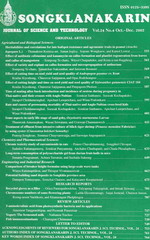ThaiScience
ThaiScience
SONGKLANAKARIN JOURNAL OF SCIENCE & TECHNOLOGY
Volume 43, No. 01, Month JANUARY, Year 2021, Pages 45 - 49
Effects of pomegranate rind (punica granatum linn.) and guava leaf extract (psidium guajava linn.) for inhibition of multidrug resistant escherichia coli recovered from diarrhoeal piglets
Kridda Chukiatsiri, Kittiphong Tippaya, Ruttayaporn Ngasaman
Abstract Download PDF
The resistance of Escherichia coli to antimicrobial drugs is widespread in Thailand and globally. The antimicrobial properties of some traditional plants have been studied as potential replacements of modern antibacterial agents. The objective of this study was to determine the antimicrobial resistance of E. coli isolated from diarrhoeal piglets and the efficacy of pomegranate rind and guava leaf extract to inhibit the growth of E. coli. Fifty isolates of E. coli from piglets with diarrhea were collected from swine farms in Chiang Mai province. The resistance to 11 antimicrobial drugs was tested using the broth microdilution method. All isolates were multidrug resistant. The most frequent were novobiocin, streptomycin, sulfamethoxazole, tetracyclin, and tiamulin (100 %). Followed by resistance to amoxicillin (98%), oxytetracyclin (96%), nalidixic acid (82%), gentamicin (56%), and colistin sulphate (46%). Pomegranate rind, guava leaf extract using the Soxhlet extraction method, and 95% ethanol as solvent were tested for their ability to inhibit the growth of drug resistant E. coli using the agar dilution method. Pomegranate rind and guava leaf extract exhibited antibacterial activity against all E. coli isolates with an average minimum inhibitory concentration of 5.94 mg/mL and 9.44 mg/mL, respectively. The results demonstrate the possibility of using herbal extracts in the prevention and treatment of high level antimicrobial-resistant E. coli in pigs.
Keywords
pigs. Keywords:SONGKLANAKARIN JOURNAL OF SCIENCE & TECHNOLOGY
Published by : Prince of Songkla University
Contributions welcome at : http://rdo.psu.ac.th
